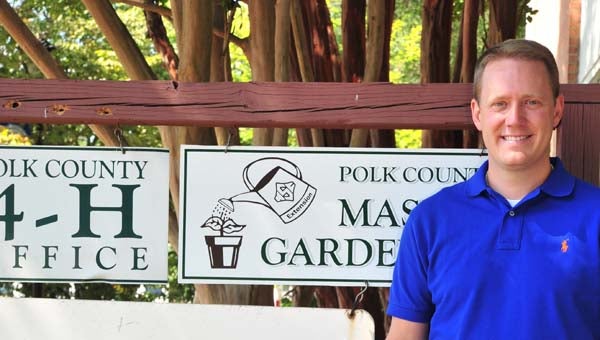Welborn joins Polk’s staff at NC Extension Office
Published 10:00 pm Friday, August 7, 2015

Home gardeners take no back seat to commercial growers at the North Carolina Cooperative Extension office in Polk County.
Though he’s just taken over as director of the agency, Scott Welborn notes that his office exists to provide the person with a small garden the same information given to someone farming a thousand acres.
Given the wealth of all scales of production in Polk County, Welborn knows that his hands will be full.
Technically, this office is an extension of North Carolina State University, which was founded as a land grant college about 150 years ago, when the Morrill Act of 1862 allowed the creation of land grant colleges to help teach best-practice techniques and information to farmers, especially to “the common man.”
North Carolina has an extension office in every county, Welborn noted, where those offices meet the mission of the Morrill Acts (of 1862 and 1890). The Smith-Lever Act of 1914 established the Cooperative Extension Service.
“We’re part university, and part county, as far as funding sources,” Welborn stated.
“We give unbiased information. We’re just trying to find the best practices, the best products.”
Welborn will focus much of his effort on horticulture programs, specifically orchards, vineyards and backyard gardens.
While he welcomes organic or other chemical-free practices (“Organics are great,” he notes), Welborn allows for all sizes of conventional production.
“People are going to use pesticides,” Welborn acknowledges. “We just want to make sure they’re using them correctly, that individuals know how and when to use them, to get maximum benefit with minimal or no side effects.”
Welborn said his office is here to provide the most help to the greatest number of individuals.
“The worst thing they can do is not ask. Just pick up the phone,” he said. The Polk County Cooperative Extension Office can be reached at 828-894-8218.
A native of Trinity, N.C., a small town in Randolph County, Welborn welcomes the welcoming nature of Polk County. He earned an undergraduate degree in business administration from Appalachian State University, and a master’s in horticulture and extension service from North Carolina State University. He is not new to Polk County, as his grandmother lives near Columbus and he spent many summers in the area as a child, according to Sarah Gottfried, administrative assistant at the extension office.
It worked out great for the job we do here,” he smiled. “I always said (cooperative) extension was the best-kept secret.”
Benefits for local growers include being able to test various seeds, chemicals and other products supplied by manufacturers who want the honest feedback that Welborn’s office will provide. He said his office won’t sugar-coat any remarks about whether something worked as advertised.
“Food security” is a term dear to Welborn’s heart. Here, he said, “you feel like you’re in the big picture with food security.”
He sees the lack of nutritious food among part of the population, and knows that individual and community gardens can go a long way to fill basic human needs. He’s worked with community gardens, where individuals toiled, to create healthful food for all.
Community gardens provide an alternative to food deserts, Welborn observed. Urban and rural areas that lack retail supplies of fresh fruits and vegetables and other nutritious foods are considered food deserts.
Welborn began his career in Davidson County, where his office was involved with a community garden. Gardeners sold vegetables to local restaurants, with income helping some less-advantaged individuals to keep their homes during the Great Recession.
Community gardens can be great social tools, Welborn observed. In Davidson County, doctors, attorneys and other professionals worked alongside those of lesser income, and got to know the latter as people.
As with his former situation, Welborn notes, “We’re not here to give hand-outs. We’re here to give a hand up. We’re an empowering force.”
“In person” is another term Welborn tries to practice, giving hands-on help to those who need it. “We try to put action out there. We try to prove it to you.”
Polk County’s Co-operative Extension office is involved with the county’s 4-H program, FCS Family Consumer Science, regarding nutrition and preserving foods.
Among the top ambassadors of the extension office are graduates of the master gardeners class, a 14-week course through the office, taught in Columbus. Call 828- 894-8218 to learn more and to register. The course includes academics, hands-on and field trips.
The county extension office provides soil-testing kits for home gardeners, at no cost during part of the year, and for a very modest cost at other times.
“I’ve taught master gardeners classes for a long time,” Welborn noted.
He notes that master gardeners “extend the extension service,” sharing knowledge and experience with eager, but less-accomplished gardeners.
“It really benefits our office to have these volunteer groups,” Welborn remarked.
Becoming involved in horticulture opened doors for Welborn.
“Horticulture was a great thing I found. It gave me opportunities I didn’t know existed,” he said.
Mathematics and science from school can be applied, giving students practical means to better learn course material. Welborn’s office works with local schools, and has a horticulture program at Polk County High School.
Assuming the duties of county extension director Aug. 1, Welborn acknowledges that he has “very large shoes to fill,” those of retired Cooperative Extension Director John Vining. Vining retired in October 2014.
Regardless, Welborn is revved up and ready to go.
“We’re here to teach,” Welborn emphasizes . . . to empower the individual to be successful. Polk County supports the people. This agency is here for the people. I could talk about extension all day.”





